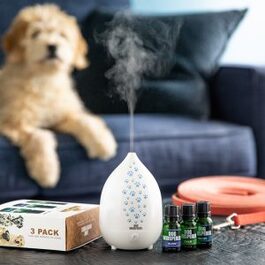 Is using Essential Oils safe or harmful to your pets? If you have been on social media lately, you may have seen articles or posts concerning essential oils, oil diffusers and the potential danger they may pose to your pets. Essential oils have been, for a long time, a popular home remedy for a number of maladies including nasal congestion, anxiety, sore muscles and skin conditions, among others. With the sudden popularity of oil diffusers—an easy way to release these oils into your home—there has been an emergence of alarm about how these oils may affect animals in the home. So, the ASPCA Animal Poison Control Center (APCC) wants shed some light on this trending topic. Are essential oils potentially harmful for your pets? And if so, what precautions should pet parents be taking?The answer, as we so often see, is slightly more complicated than a simple “yes,” or “no.” In their concentrated form (100%), essential oils can absolutely be a danger for pets. Dogs and cats who have either walked through oils, gotten some on their coat or had oils placed directly on them can develop health concerns. Symptoms include:
Are some oils/scents more dangerous than others?Some oils may in fact be more harmful than others. However, there are several factors that affect this such as concentration level, and what the product is mixed with. For example, concentrated forms of tea tree oil (melaleuca oil) may cause issues for your pets with only seven or eight drops, whereas another oil may take more or less. Due to the variability in concentration, formulation and possible quality of essential oils, it is best to completely avoid directly applying them to your pet. You should also keep any oils up and out of paws' reach to prevent potential ingestion. So, does that mean you should return your diffuser?According to APCC, not necessarily. Using an oil diffuser for a short time period in a secured area— one that your dog or cat cannot access—is not likely to be an issue. However, if your pet has a history of breathing problems, it may be best to avoid using one altogether. Keep in mind, that your pets have a much better sense of smell than we do, so something that seems light to us may be overwhelming to them. If you do decide to keep your diffuser, you’ll want to ensure that it is in a place where your pet cannot knock it over and potentially expose themselves to the oils. The best way to avoid exposing your pets to dangerous substances is always to err on the side of caution and by “pet-proofing” your space. While these same concerns with essential oils will apply to other pets such as rabbits, guinea pigs and hamsters, it is best to avoid using an essential oil diffuser in your house if you have birds. Birds’ respiratory tracts are very sensitive, and they may develop more serious problems if you use a diffuser. If you think your pet may have ingested, or been exposed to a potentially poisonous substance, contact your veterinarian or the APCC at (888) 426-4435 immediately. You can learn more about keeping your pets safe from toxins by downloading the APCC Mobile App or checking out our entire list of dangerous household products.
0 Comments
Leave a Reply. |
Archives
July 2024
Categories |

 RSS Feed
RSS Feed